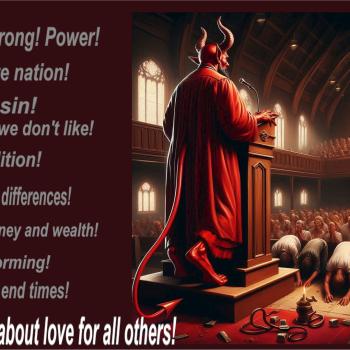The Big Questions series
View this video podcast on YouTube.
An incredibly simple question with a very simple but incredibly complex answer, is, “What is a Christian.” No doubt my answer will put many people into a tizzy.
Simply put, a Christian is a follower of Christ. The complexity is in the details and differences of opinion.

Image of Jesus by Meranda D on Pixabay.
What does it mean to be a Christian?
In my opinion, Christians tend to assemble regularly with others of like belief and mission to worship God. According to Jesus and ancient prophets of Israel, true worship is about acting with love every day toward others.
In worship services, Christians praise God and tell stories about how doing things God’s way impacts their lives. They also attend to services to learn about Jesus and the Bible, and to do collective beneficial action that reflects God’s love in the world.
The Church as a collective body of all Christians is Jesus’ body on earth representing both God’s love and benevolent action. Their message is the Good News of forgiveness, peace, and abundant life in Christ that comes through personal transformation. Personal transformation is about acting in love for others through following Jesus’ way to live.
Jesus taught that no intermediary, such as a priest or minister, is needed between individuals and God. Forgiveness is for asking directly from God. Of course they can have an intermediary if they want one, and many do.
Christian groups
Christian groups set different missions.
One variation is a huge Christian collective who feel their mission in today’s age is to bring the message of salvation to others that comes from personal transformation (being born again). They also bring them into the Christian collective. Their emphasis is on personal salvation for eternal life.
Another variation is groups who believe their mission is to tell others what sin is. God put the law into people’s hearts but this group doesn’t feel like people recognize what they feel is sin. Some believe it is too difficult to understand what sin is and have even ventured so far as to list what they think Jesus taught as individual sins and create commandments about them, just as the ancient Jews did in listing 613 commandments in the first five books of the Bible.
Another group translates many Bible passages as future apocalyptic, rather than as events that have already happened or can happen in individual’s lives. Apocalyptic means a highly destructive transition in which Christ returns, brought about by evil, or means destruction of the world brought about by evil. This group watches for signs indicating society is becoming evil and the end is near in their opinion.
Christians vary in what they emphasize about Jesus. The cross represents Christianity. Some believe that Jesus came to the Jews to end sacrifice necessary for forgiveness, offering himself as a final sacrifice. There are some who believe that this sacrifice is for all and represents a suffering Jesus who is nailed to a cross for all to see. According to some, this was about opening the door to Heaven for all and displaying a cross that was empty. To some it’s both.
A majority of Christians believe that God and Jesus are active in their spiritual lives, answer prayer, and can even carry out miracles in the physical world.
For some Christianity is a lifeless tradition, meaning God has spoken and there is no further message. Others believe that Christianity is a living tradition of discovery and that God is forever speaking.
There are over 2000 different Christian denominations in the world and over 1200 in the US. These denominations have different insights into God and different ideas of their mission.
Religion
Christianity in groups often reflects local culture, adopting local values and beliefs. This gets into the realm of religion. In some areas even Voodoo is mixed in. Some bring their guns to church. Religion is locally and culturally situated.
Christianity professes beliefs that vary from denomination to denomination. “Religion is a range of social-cultural systems, including designated behaviors and practices, morals, beliefs, worldviews, texts, sanctified places, prophecies, ethics, or organizations, that generally relate humanity to supernatural, transcendental, and spiritual elements.” – Wikipedia.
In this context, denominations see Jesus as God or believe Jesus represents God.
The Kingdom of God
In an era of democracy, the word kingdom and ideas about being ruled over and obedience seem archaic and out of place. But God allows us the freedom to choose our life path. Simply put, those who choose the path of love are in the Kingdom.
God’s kingdom is spiritual, not religious. Many early Christians, and today including many and myself, think of themselves as “Followers of the Way,” even if we don’t do it very well and have to keep trying. Jesus was a representative of God and showed us the way to live. It is the way to God and spirituality is about reconciling individuals with God.
Accepting and following the way to live gives us a season ticket to the Kingdom of God. This is a spiritual kingdom here now and forever. Season tickets are endless and carry us into eternity.
God is love. Jesus is the way of love. Those who obey the law in their hearts and act out of love for others are in the Kingdom of God, regardless of their religious beliefs.
Future of Christianity
Each year since 1900 Christianity has lost members as a percentage of the population, at the rate of 1% decline a year. In the 1970s it was noted that people like Jesus but not the church. This decline accelerated after the year 2000.
Many people identify as Christian but decline to identify with a specific denomination. As churches lose members they lose the ability to financially support themselves and close. This hits rural areas especially hard because of the sparse population.
Generation Z and many Millennials blame churches and other organizations for many abuses and discrimination in society. They turn their backs on the church. They seek spiritual knowledge and want to be part of something larger than themselves. However, they are separatists, so they don’t find what they’re seeking in the church. I write for this group to help them weed out the nonsense.
Takeaway
I believe my statements in this post-article about what is a Christian are supported by the Bible. But then you can find support for anything you want to believe in the Bible. Understanding the overall theme of the Bible and looking for internal integrity in that theme helps understanding. Love is the defining principle.
I won’t give specific Scriptures to support these statements. Citing verses turns into a match between rivals with different opinions who have their favorite verses to throw. You can already find them all across the Internet.
A Christian is someone who practices Jesus’ way of living. Christianity is about loving and transforming individuals to live the way Jesus taught us. Transformation is described in many ways such as born again, a believer, a follower, giving your life to Christ, etc. It all amounts to the same thing. Transformation means turning from ways that hurt others (sin) and instead loving others.
I hope this has helped your understanding of what being a Christian is all about.
You might also enjoy my new podcast, Our Times today and tomorrow and article series on Substack, which delves more deeply into a wide variety of topics with a spirituality focus. My Patheos posts-articles will also become a podcast or videocast. (It takes a lot of work.)
________________________
The standard of belief and conduct for Christianity is love. God is love. We’re asked to be like God.
________________________
If you find these articles intriguing, please consider joining the mailing list.
If I’ve challenged your thinking, I’ve done my job.
___________________
Our answer is God. God’s answer is us. Together we make the world better.
– Dorian

















